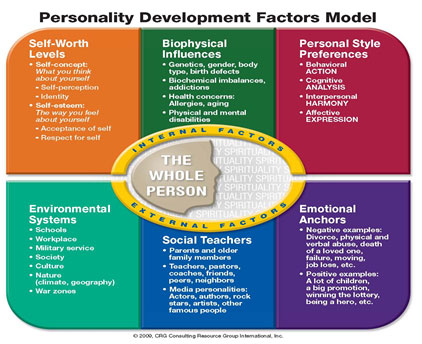Environmental Systems and Personal Development (Part Five)
By Ken Keis
This is the fifth of a seven-part series. Start with Part One and watch for Part Six in HRVoice.org.
Revisiting the Personality Factors Development Model, we have thus far examined the varied impacts of self-worth, biophysical influences and personal style preferences on individual development. What then of the environmental systems that surround and extrinsically impact us on a daily basis?
This category includes any form of experiential stimulus we receive from the environment around us—a stimulus that does not belong specifically in any of the other categories. That includes all the general influences we experience in our lives as result of being members of certain social, cultural, and ethnic groups.
It also refers to any form of environmental stimulus, other than the influence of people who have functioned in some way as significant role models for us. For instance, while a person’s whole family unit would be included here, the role played by a specific relative would belong in the Social Teacher category.
We know that in addition to Social Teachers, we are strongly influenced by the Environmental Systems that surround us as we grow up. The first such system is our family of origin—the family unit in which you were raised from birth to young adulthood. If I were examining the Social Teacher category, I would be especially interested in how Mom and Dad treated me. In looking into the Environmental Systems category, I am more interested in how my personality was affected by my exposure to, as well as my observations of, the interactions of my family.
Children are often the family’s audience. Much of our childhood time is spent watching what is occurring within the family unit rather than actively participating in it. Within that category, we are interested in information such as how Mom and Dad communicated, problem-solved, argued, made up after an argument, showed affection, discussed sexual issues, and took vacations.
With divorce rates now over 50 per cent, many kids have an unstable environment; the environmental condition highly affects children’s perspectives of life.
Also important are other interactions within the family, such as how an older brother got along with Mom, a younger sister with Grandpa, or Dad with his in-laws. All those kinds of everyday family interactions created an environment that shaped our perceptions of, and attitudes toward, family life and—more important—life in general.
Other Environmental Systems would include schools you have attended, towns or cities where you have lived, the countryside where you grew up, the society and cultures that influenced you, military service, and associations and organizations to which you belonged.
Even climate conditions and acts of nature can have an impact on the way you look at life. Climate can affect you and your responses. It is well known in long-night northern winters that many people suffer from seasonal affective disorder (SAD). They need exposure to sunlight for a certain length of time each day or they start to feel lethargic, moody, and depressed.
What about growing up in a war-torn area or a place of high conflict? That certainly will affect your perceptions and responses and shape your thinking, compared to growing up in a peaceful area. Every day, there are, on average, 50 different armed conflicts going on in the world. Those who survive the experience are usually strongly affected by the violence and horrible social conditions they see. Often, their personalities and behavior reveal major shifts as a result of exposure to war, evident in many of the soldiers who served active duty in the various wars.
The following factors are examples of Environmental Systems:
| Families of origin | Step families | Foster families |
| School systems | Places of work | Geographic settings |
| Organizations | Climatic conditions | Communities |
| Natural catastrophes | Religious groups | Cult groups |
| Cultures | Military service |
Not long ago, CRG had six different cultures represented in a small work group, we quickly recognized that environmental systems highly influence team dynamics. With diversity the norm our HR processes must acknowledge and identify how environment systems (including your work culture) are shaping how your team members interact and engage your workplace.
To learn more about how your environmental systems have shaped your orientation towards entrepreneurship consider the Entrepreneurial Style and Success Indicator, go to www.crgleader.com to learn more.
Ken Keis is considered a global authority on the way assessment strategies increase and multiply your success rate. In 22 years, he has conducted more than 2000 presentations and 10,000 hours of consulting and coaching. Author of Why Aren’t You More Like Me? Discover the Secrets to Understanding Yourself and Others, Ken can be contacted at 604 852-0566, info@crgleader.com, or through www.whyarentyoumorelikeme.com.







